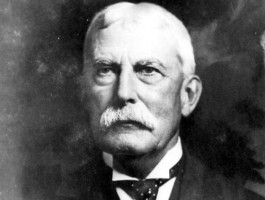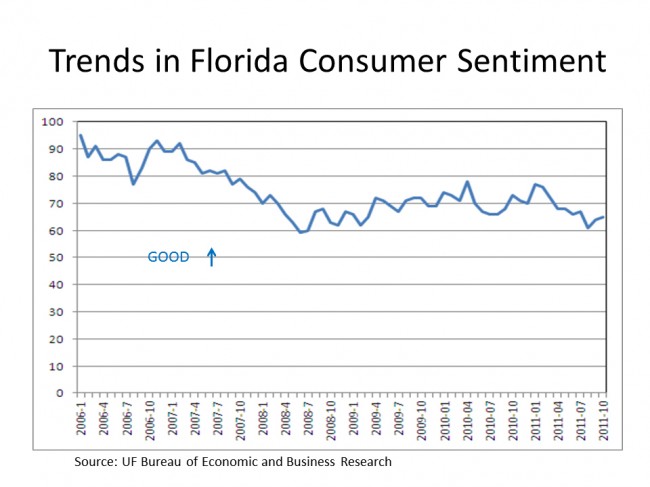
You’re welcome to send your Live Wire news tips or suggestions to [email protected].
Today’s Live Wire: Quick Links
- Henry Flagler Is Dead
- Regulations Kill Jobs? Think Again
- FCAT’s Coming F Schools
- Palm Coast’s Pot Future?
- Reefer Madness
- Floridians’ Consumer Confidence
- How Will Ferrell Touched Me
- Peter Gabriel: a Full Concert
- Romenesko Is Gone
- Flash Mob Dubai
- America’s Superiority Complex
![]()
![]()

See Also:
- History of English in 10 Minutes
- From DuPont to ITT: A Century of Marketing Flagler County to Northern Chill Migrants
- So Long, Sadie Strickland: Bunnell Centenarian Was Told Flagler Would Devour Her in 1927
Regulations Kill Jobs? Think Again
 Back in September we ran a ProPublica piece that busted that myth going around the Fox airwaves and GOP circles about regulations killing jobs. The Washington Post has just done its own bit and reached the same conclusions: “In the face of the country’s unemployment crisis, many politicians have portrayed regulations as the economy’s primary villain. […] In 2010, 0.3 percent of the people who lost their jobs in layoffs were let go because of “government regulations/intervention.” By comparison, 25 percent were laid off because of a drop in business demand.” Regulations in some cases create jobs: “Another AEP coal plant in nearby Conesville required more than 1,000 temporary workers to build a scrubber for one of its units. The plant then added 40 full-time employees to monitor the scrubber, which doubled the footprint of the unit. The device requires so much machinery it has its own control room. Ralph Izzo, chief executive of the New Jersey utility PSE&G, said installing scrubbers at two of his company’s coal plants created 1,600 jobs for two years, plus 24 permanent ones. […] Economists who have studied the matter say that there is little evidence that regulations cause massive job loss in the economy, and that rolling them back would not lead to a boom in job creation. Firms sometimes hire workers to help them comply with new rules. In some cases, more heavily regulated businesses such as coal shrink, giving an opportunity for cleaner industries such as natural gas to grow.” The full story.
Back in September we ran a ProPublica piece that busted that myth going around the Fox airwaves and GOP circles about regulations killing jobs. The Washington Post has just done its own bit and reached the same conclusions: “In the face of the country’s unemployment crisis, many politicians have portrayed regulations as the economy’s primary villain. […] In 2010, 0.3 percent of the people who lost their jobs in layoffs were let go because of “government regulations/intervention.” By comparison, 25 percent were laid off because of a drop in business demand.” Regulations in some cases create jobs: “Another AEP coal plant in nearby Conesville required more than 1,000 temporary workers to build a scrubber for one of its units. The plant then added 40 full-time employees to monitor the scrubber, which doubled the footprint of the unit. The device requires so much machinery it has its own control room. Ralph Izzo, chief executive of the New Jersey utility PSE&G, said installing scrubbers at two of his company’s coal plants created 1,600 jobs for two years, plus 24 permanent ones. […] Economists who have studied the matter say that there is little evidence that regulations cause massive job loss in the economy, and that rolling them back would not lead to a boom in job creation. Firms sometimes hire workers to help them comply with new rules. In some cases, more heavily regulated businesses such as coal shrink, giving an opportunity for cleaner industries such as natural gas to grow.” The full story.
See Also:
- Job-Killing Regulations: Busting the Myths
- Florida’s Deregulation Follies
- Wages Down, Hours Up
- For Sale: Florida Legislature
 From the Times-Union: “Proposed achievement levels for the Florida Comprehensive Assessment Test would dramatically change school grades in the state, potentially tripling the number of F schools while providing a more gradual increase in difficulty as students matriculate. The proposal would give Florida the most rigorous state exam in the country, said Duval County Public Schools Superintendent Ed Pratt-Dannals, who participated in the vetting process for the new proposal. […] Pratt-Dannals said the changes will give clearer measures of students abilities and gradually demand more of students as they are promoted grade to grade as well as help prepare students and teachers for tougher standards that will be in place in 2015 when Florida and several other states begin giving the same exams. […] The number of D schools would double and F schools would triple going from about 30 to about 90 statewide, based on the 2010-11 FCAT results. […] The big swings would be in third and 10th grade reading. In third grade, proficiency in reading drops from 69 percent to 55 percent under the proposed measure, in 10th grade it jumps from 34 percent proficient in reading to 49 percent. […] Just because a school’s grade drops or increases this year won’t necessarily mean student performance in that school changed, it’s just that the ruler used to measure that performance has changed.” The full story.
From the Times-Union: “Proposed achievement levels for the Florida Comprehensive Assessment Test would dramatically change school grades in the state, potentially tripling the number of F schools while providing a more gradual increase in difficulty as students matriculate. The proposal would give Florida the most rigorous state exam in the country, said Duval County Public Schools Superintendent Ed Pratt-Dannals, who participated in the vetting process for the new proposal. […] Pratt-Dannals said the changes will give clearer measures of students abilities and gradually demand more of students as they are promoted grade to grade as well as help prepare students and teachers for tougher standards that will be in place in 2015 when Florida and several other states begin giving the same exams. […] The number of D schools would double and F schools would triple going from about 30 to about 90 statewide, based on the 2010-11 FCAT results. […] The big swings would be in third and 10th grade reading. In third grade, proficiency in reading drops from 69 percent to 55 percent under the proposed measure, in 10th grade it jumps from 34 percent proficient in reading to 49 percent. […] Just because a school’s grade drops or increases this year won’t necessarily mean student performance in that school changed, it’s just that the ruler used to measure that performance has changed.” The full story.
See Also:
 If Las Vegas’s problem with chronic foreclosures is any indication, Palm Coast’s problem could not be far behind, if it isn’t there already. From the LATimes: “Las Vegas has a pot home problem. And like many of the region’s maladies, it’s tied to the housing slump. Last year, authorities took down 153 indoor grow sites in Nevada and seized more than 13,000 plants, compared with 18 sites and 1,000 plants in 2005, the U.S. Drug Enforcement Administration said. (By comparison, California busted 791 indoor sites last year.) […] Major cultivators spend tens of thousands of dollars turning cheap homes into greenhouses. Small-scale growers transform bedrooms into grow rooms, as Fredrica Ballard, 43, and her two adult sons are accused of doing in a foreclosure-turned-rental home. The Ballards have pleaded not guilty to possession charges, and their attorneys did not respond to requests for comment. In neighborhoods where residents may be as transient as crowds in a subway station, growers are rarely questioned about dark windows and empty driveways. Those are also hallmarks of abandoned homes, of which America’s foreclosure capital has plenty.” The full story.
If Las Vegas’s problem with chronic foreclosures is any indication, Palm Coast’s problem could not be far behind, if it isn’t there already. From the LATimes: “Las Vegas has a pot home problem. And like many of the region’s maladies, it’s tied to the housing slump. Last year, authorities took down 153 indoor grow sites in Nevada and seized more than 13,000 plants, compared with 18 sites and 1,000 plants in 2005, the U.S. Drug Enforcement Administration said. (By comparison, California busted 791 indoor sites last year.) […] Major cultivators spend tens of thousands of dollars turning cheap homes into greenhouses. Small-scale growers transform bedrooms into grow rooms, as Fredrica Ballard, 43, and her two adult sons are accused of doing in a foreclosure-turned-rental home. The Ballards have pleaded not guilty to possession charges, and their attorneys did not respond to requests for comment. In neighborhoods where residents may be as transient as crowds in a subway station, growers are rarely questioned about dark windows and empty driveways. Those are also hallmarks of abandoned homes, of which America’s foreclosure capital has plenty.” The full story.
See Also:
- Fake Marijuana, Fake Glock, Alleged Kidnapping, Real Charges and Jail for 3 “Losers”
- Legalize Marijuana in Florida?
- Florida, Oxycodone Central
 Ethan Nadelmann in The Times: “Marijuana is now legal under state law for medical purposes in 16 states and the District of Columbia, encompassing nearly one-third of the American population. More than 1,000 dispensaries provide medical marijuana; many are well regulated by state and local law and pay substantial taxes. But though more than 70 percent of Americans support legalizing medical marijuana, any use of marijuana remains illegal under federal law. […] The Treasury Department has forced banks to close accounts of medical marijuana businesses operating legally under state law. The Internal Revenue Service has required dispensary owners to pay punitive taxes required of no other businesses. The Bureau of Alcohol, Tobacco, Firearms and Explosives recently ruled that state-sanctioned medical marijuana patients can not purchase firearms. […] President Obama has not publicly announced a shift in his views on medical marijuana, but his administration seems to be declaring one by fiat. The head of the Drug Enforcement Administration, Michele M. Leonhart, a Bush appointee re-nominated by Mr. Obama, has exercised her discretionary authority to retain marijuana’s classification as a Schedule I drug with “no currently accepted medical use in treatment in the United States.” And the pronouncements on marijuana, medical and otherwise, from Mr. Obama’s top drug policy adviser, R. Gil Kerlikowske, have been indistinguishable from those of Mr. Bush’s. None of this makes any sense in terms of public safety, health or fiscal policy.” The full column.
Ethan Nadelmann in The Times: “Marijuana is now legal under state law for medical purposes in 16 states and the District of Columbia, encompassing nearly one-third of the American population. More than 1,000 dispensaries provide medical marijuana; many are well regulated by state and local law and pay substantial taxes. But though more than 70 percent of Americans support legalizing medical marijuana, any use of marijuana remains illegal under federal law. […] The Treasury Department has forced banks to close accounts of medical marijuana businesses operating legally under state law. The Internal Revenue Service has required dispensary owners to pay punitive taxes required of no other businesses. The Bureau of Alcohol, Tobacco, Firearms and Explosives recently ruled that state-sanctioned medical marijuana patients can not purchase firearms. […] President Obama has not publicly announced a shift in his views on medical marijuana, but his administration seems to be declaring one by fiat. The head of the Drug Enforcement Administration, Michele M. Leonhart, a Bush appointee re-nominated by Mr. Obama, has exercised her discretionary authority to retain marijuana’s classification as a Schedule I drug with “no currently accepted medical use in treatment in the United States.” And the pronouncements on marijuana, medical and otherwise, from Mr. Obama’s top drug policy adviser, R. Gil Kerlikowske, have been indistinguishable from those of Mr. Bush’s. None of this makes any sense in terms of public safety, health or fiscal policy.” The full column.
See Also:
- Drug Policy Alliance
- Fake Robberies, Fake Guns, Fake Threats Over Real Pizza, Gas and Cigarette Money
Floridians’ Consumer Confidence, 2006-2011

From the Bureau of Economic and Business Research at UF: “Florida’s consumer confidence index rose this month to 64, up three points from a revised mark of 61 in August, which was only two points higher than the record low of 59 set in June 2008, according to a new University of Florida survey. “The increase in confidence this month was mostly a rebound from very low levels in August,” said Chris McCarty, director of UF’s Bureau of Economic and Business Research and Survey Research Center, which conducted the survey. […] The only component to show a decline in September was the perception that personal finances today are lower than a year ago. It fell by three points to 50, which means more consumers are pessimistic. According to the survey, Florida’s seniors, whose perceptions accounted for much of the decline in August, remain pessimistic about the economy in both the short and long run. Confidence levels of those over 60 are at “record lows,” McCarty said.”
See Also:
See Also:
Peter Gabriel at the Ed Sullivan Theater in new York, with his 46-piece orchestra:
See Also:
Poynter’s Jim Romenesko Is Gone
 Jim Romenesko, for a dozen years the voice and face of the Romenesko media watchdog website at the Poynter Institute–and the site that gave Poynter more visibility than it could dream of–is gone. “Thanks to the sharp eye of Erika Fry, an assistant editor at the Columbia Journalism Review, I now know that Jim Romenesko’s posts exhibit a pattern of incomplete attribution,” writes Julie Moos, director of Poytner Online, in an incredible overreach. “Though information sources have always been displayed prominently in Jim’s posts and are always linked at least once (often multiple times), too many of those posts also included the original author’s verbatim language without containing his or her words in quotation marks, as they should have.” As David Carr wrote in The Times (and here, be sure to follow the qute marks to know who’s writing what), “let me translate: ‘Jim’s use of quote marks blahbity-blah resulted in questionable whoopdedoo and we are now totally on the case of not very much.’ As Peter Kafka of AllThingsD pointed out in a Tweet, it seemed like a parody of church-lady journo etiquette, but it was real. The whole post seemed like an answer in search of a problem. Ms. Moos herself suggested that no one had actually complained, but went on to say: ‘We are in uncharted territory, marked by uncertainty, which suggests caution. We will continue to evaluate this situation and to be as transparent as possible about what we learn and decide.’ That clears everything up. Seven weeks short of retirement, Mr. Romenesko responded by resigning on Twitter — oh, sweet paradigm-shifting irony — in typically understated style.” This is what Romenesko wrote: “Poynter has accepted my resignation. Thanks to all for the incredible support today.”
Jim Romenesko, for a dozen years the voice and face of the Romenesko media watchdog website at the Poynter Institute–and the site that gave Poynter more visibility than it could dream of–is gone. “Thanks to the sharp eye of Erika Fry, an assistant editor at the Columbia Journalism Review, I now know that Jim Romenesko’s posts exhibit a pattern of incomplete attribution,” writes Julie Moos, director of Poytner Online, in an incredible overreach. “Though information sources have always been displayed prominently in Jim’s posts and are always linked at least once (often multiple times), too many of those posts also included the original author’s verbatim language without containing his or her words in quotation marks, as they should have.” As David Carr wrote in The Times (and here, be sure to follow the qute marks to know who’s writing what), “let me translate: ‘Jim’s use of quote marks blahbity-blah resulted in questionable whoopdedoo and we are now totally on the case of not very much.’ As Peter Kafka of AllThingsD pointed out in a Tweet, it seemed like a parody of church-lady journo etiquette, but it was real. The whole post seemed like an answer in search of a problem. Ms. Moos herself suggested that no one had actually complained, but went on to say: ‘We are in uncharted territory, marked by uncertainty, which suggests caution. We will continue to evaluate this situation and to be as transparent as possible about what we learn and decide.’ That clears everything up. Seven weeks short of retirement, Mr. Romenesko responded by resigning on Twitter — oh, sweet paradigm-shifting irony — in typically understated style.” This is what Romenesko wrote: “Poynter has accepted my resignation. Thanks to all for the incredible support today.”
It’s not likely the Romensko site, renamed “MediaWire,” will have much of its old, must-read qualities. But he’s moving his digs to his own site.
See Also:
Dubai couldn’t leave Beirut unanswered:
See Also:
Charles Blow in The Times: “Is America exceptional among nations? Are we, as a country and a people and a culture, set apart and better than others? Are we, indeed, the “shining city upon a hill” that Ronald Reagan described? Are we “chosen by God and commissioned by history to be a model to the world” as George W. Bush said? According to a report issued on Thursday by the Pew Research Center’s Global Attitudes Project, when Americans were asked if they agreed with the statement “our people are not perfect but our culture is superior to others,” only 49 percent agreed. That’s down from 60 percent in 2002, the first time that Pew asked the question. Perhaps even more striking was that, among young people (those ages 18 to 29), the percentage of Americans who believed that their culture was superior was lower than young citizens of Germany, Spain and Britain. […] We have to stop snuggling up to nostalgia, acknowledge that we have allowed a mighty country to be brought low and set a course to restitution. And that course is through hard work and tough choices. You choose greatness; it doesn’t choose you.” The full piece.






























Leave a Reply